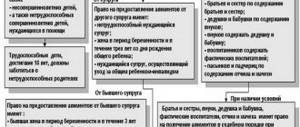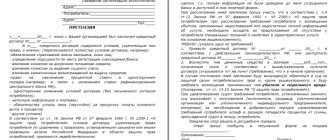Alimony for wife: grounds for collection
Recall the basic principles and grounds for collecting alimony for an ex-wife and mother of a child. The grounds for collecting alimony are:
- Spouse's pregnancy;
- Raising a child under three years of age;
- Disability acquired during marriage or within a year after divorce.
In all the above circumstances, a woman is simply not able to provide for herself or get a job, since she needs to restore her health and care for a newborn or young child. In addition, alimony for the maintenance of the wife is extended if she is caring for a disabled child.
Articles on the topic (click to view)
- Assignment of the right to claim under alimony obligations is possible
- Formula for calculating penalties and fines for alimony: sample
- What are the consequences of non-payment of alimony in 2021?
- Find out the debt by name from the bailiffs for alimony
- Reducing alimony debt over the past period
- Payment of alimony voluntarily without agreement
- Criminal liability for non-payment of alimony under Art. 157 of the Criminal Code of the Russian Federation
The obligation of spouses (including former spouses) to help each other financially is enshrined in the Family Code of the Russian Federation (Articles 89-90).
However, we should not forget that our society is not devoid of selfish women who are ready to use any tricks in order to “sit at home” and do nothing. It is in this case that a man may be able to get away from alimony if he proves the illegality of collecting it.
Amount of payments for maintenance and methods of receipt
The law does not specify the exact amount that a man must pay to support his wife. Depending on the situation, the amount of payments is determined in one of the following ways:
- On a voluntary basis. The best solution is when the husband and wife agree on payments and indicate the amount allocated for maintenance in the contract. The agreement can be drawn up in writing by a notary or orally.
- Through the court. If the parties were unable to reach an amicable agreement, the woman has the right to apply to a judicial authority and forcibly demand money for maintenance. In this case, the judge takes into account the circumstances of the case - the financial condition of the parties, the presence of a new husband or wife of the former spouses, the number of children, etc.
In both cases, the man has the right to refuse expenses and not pay money for the maintenance of his wife. But there are nuances here.
How to legally avoid alimony for your ex-wife?
For the luck of men who want to get away from alimony for the maintenance of their wife, the Family Code contains an exhaustive list of legal grounds for removing obligations to their spouse. Their list includes the following circumstances:
- The wife's incapacity for work or disability of group 1 or 2 occurred as a result of: Her commission of a crime;
- As a result of alcoholic or drug intoxication;
- Failure to carry out the actions prescribed by the instructions, resulting in injury.
- Infidelity, neglect of marital fidelity;
If a man decides to get away from alimony legally through the court, he must be prepared for the fact that the court considers each case individually and can evaluate the marital relationship differently.
Results
The RF IC (Article 90) specifies several situations when a man is obliged to pay money for the maintenance of his wife. But in Art. 92 of the Family Code there are a number of exceptions that allow you to escape the financial burden. To resolve the issue, you can reach an agreement directly with your spouse or go to court. In the latter case, you will have to collect papers confirming the spouse’s position and allowing you to avoid payments.
Each case is individual. Everything that is written in the statement of claim must be supported by documents. If you have any doubts, contact our website lawyers for a free consultation.
Can a court cancel alimony for a wife?
Good evening, Alexander.
This is important to know: Indexation of alimony to the minimum wage of 100 rubles
The loan will remain with the one who keeps the car. You can split the loan, in which case you will have to share the car... there are nuances there. I don't go into them. You write credit to yourself in your layouts. Why? Are you planning to keep the car? sell. pay off the loan.. cut costs.
Alimony for the maintenance of a wife (ex-wife) is collected only if the alimony payer has the necessary funds to provide it. So, for example, if the alimony payer has an income less than or equal to the subsistence minimum, then it is obvious that he will not be able to provide the other spouse with money. Collection of alimony in this case is unacceptable, since it will lead to the impossibility of the existence of the person obligated to pay alimony.
The amount of alimony exacted from a wife (ex-wife) in court is determined by the court based on the financial and marital status of the spouses (former spouses) and other noteworthy interests of the parties in a fixed sum of money payable monthly. At the same time, taking into account the financial situation of the parties involves comparing the level of income of the recipient and the alimony payer.
When determining the marital status of the alimony payer, only persons to whom he is legally obligated to provide maintenance are taken into account.
The court may release the spouse from the obligation to support another disabled spouse in need of assistance or limit this obligation to a certain period both during the marriage and after its dissolution.:
in the event that the incapacity for work of the wife in need of help resulted from the abuse of alcoholic beverages, drugs or as a result of her committing an intentional crime;
if the spouses are married for a short period of time;
in case of unworthy behavior of the wife in the family.
There is a chance. the size of the chances is difficult to guess at the moment. Need more information.
Yes, you can ask the court to reduce the amount of alimony due to your difficult financial situation. At the same time, it is not a fact that the amount of alimony for the spouse will also be about 7 thousand rubles.
Article 91 of the Family Code. The amount of alimony collected from spouses and former spouses in court
In the absence of an agreement between the spouses (former spouses) on the payment of alimony, the amount of alimony exacted from the spouse (former spouse) in court is determined by the court based on the financial and marital status of the spouses (former spouses) and other noteworthy interests of the parties in a fixed monetary amount, payable monthly.
Article 119 of the Family Code. Changing the amount of alimony established by the court and exemption from paying alimony
1. If, in the absence of an agreement on the payment of alimony, after the amount of alimony has been established in court, the financial or marital status of one of the parties has changed, the court has the right, at the request of either party, to change the established amount of alimony or to exempt the person obliged to pay alimony from paying it. When changing the amount of alimony or when releasing it from payment, the court also has the right to take into account other noteworthy interests of the parties.
In addition, since the loan was taken out during marriage, the debts can also be divided in half in accordance with Article 39 of the Family Code of the Russian Federation and the spouse can be obliged to pay half of the payment on the loan debt every month.
Article 39. Determination of shares when dividing the common property of spouses
1. When dividing the common property of spouses and determining shares in this property, the shares of the spouses are recognized as equal, unless otherwise provided by the agreement between the spouses.
2. The court has the right to deviate from the beginning of equality of shares of spouses in their common property based on the interests of minor children and (or) based on the noteworthy interests of one of the spouses, in particular, in cases where the other spouse did not receive income for unjustified reasons or spent the common property of the spouses to the detriment of the interests of the family.
3. When dividing the common property of the spouses, the common debts of the spouses are distributed between the spouses in proportion to the shares awarded to them.
Among other things, you and your spouse can enter into a written notarial agreement on the payment of alimony and agree on a monthly payment of a certain amount, which will not be an invoice for you - Chapter 16 of the Family Code of the Russian Federation - https://www.consultant.ru/popular/family/ 20_20.html#p825
1. The court can cancel alimony only on the basis of Art. 92 of the Family Code of the Russian Federation.
Article 92. Release of a spouse from the obligation to support the other spouse or limitation of this obligation for a period
This is important to know: Application for suspension and resumption of enforcement proceedings on alimony
The court may release the spouse from the obligation to support another disabled spouse in need of assistance or limit this obligation to a certain period both during the marriage and after its dissolution:
in the event that the incapacity for work of the spouse in need of assistance occurred as a result of the abuse of alcoholic beverages, drugs or as a result of his commission of an intentional crime;
if the spouses are married for a short period of time;
in case of unworthy behavior in the family of a spouse requiring payment of alimony.
If in your case there are no such grounds, then it is better for you to agree with at least some amount of alimony for your spouse to show that you are not against it, but the requested amount is very large for you. For example. within 3-4 thousand rubles. those. YOU SHOULD ASK THE COURT FOR A REDUCTION OF THE AMOUNT according to Art. 91 of the Family Code of the Russian Federation: the amount of alimony exacted from a spouse (former spouse) in court is determined by the court based on the financial and marital status of the spouses (former spouses) and other noteworthy interests of the parties in a fixed sum of money payable monthly.
2. Since your child is less than a year old, then, according to Article 17 of the Family Code of the Russian Federation, the husband does not have the right, without the consent of his wife, to initiate proceedings for divorce during the wife’s pregnancy and within a year after the birth of the child. PLEASE TAKE THIS POINT ALSO IN CONSIDERATION.
3. While you have not yet had a division of property, I would like to draw your attention to the following:
-if the car is registered in your name and you use it, then the court on the basis of Art. 38 of the Family Code of the Russian Federation... has the right to leave it to you, but you will be obliged to pay your ex-wife (if you divorce) monetary compensation in the amount of half of the market value of the car at the time of division of property.;
— as for the loan, there is a nuance here: if it is spent on family needs (and there is written evidence of this), then you have the right to ask the court to recover half of the loan you paid for the period from the moment of divorce or termination of family relationships. You will not be able to transfer a debt or part of a debt without the consent of the bank according to Art. 391 Civil Code of the Russian Federation.
I am telling you the judicial practice that I constantly encounter.
I would be grateful for your positive feedback.
Cancellation of alimony for the maintenance of the ex-wife
Responsibilities for maintaining the wife, whether the couple is divorced or married, are imposed by the relevant articles of the Family Code of the Russian Federation. In this case, the amount of alimony for the maintenance of a spouse after divorce can be determined either by a mutually beneficial agreement, certified by a notary, or in the process of a court decision. The process of calculating maintenance and canceling alimony is considered in each individual case, based on the financial situation of the parties, ability to work and other factors.
- Most cases regarding alimony are extremely individual and consist of a very large number of factors.
- Understanding the legal framework is desirable, but it cannot guarantee a solution to your specific situation.
Therefore, you can check any information with our on-duty legal consultants 24/7 and free of charge.
You can contact them in the following ways:
1) in online chat or through the form below
2) Or call the 24-hour hotline by phone: Moscow: St. Petersburg: For other regions: – the call is free from anywhere in Russia.
In what situations is alimony calculated for the maintenance of a former spouse?
Chapter 14, Section 5 of the RF IC specifies situations in which the husband is required to provide financial assistance for his ex-wife related to:
- Maintenance of the spouse for the entire period of pregnancy and for three years after the birth of a joint child;
- The extreme need in which the ex-wife finds herself raising a disabled child together;
- The disability of a divorced spouse, which does not allow her to work while raising children until they reach the age of 18.
Only a court can accurately determine the criteria for the neediness of an ex-wife, taking into account the financial condition of both spouses and the ability to raise joint children. Even if the mother has a job that does not greatly affect her material well-being and covers only daily needs, the court can award the ex-husband payment of alimony.
How to deprive your ex-wife of alimony?
The situation when ex-wives abuse their legal rights is not uncommon, and divorced husbands have to pay alimony to their ex-spouses until their common children reach the age of 18. Often, mothers have completely stable jobs and do not need anything. The cancellation of alimony for the maintenance of the mother of common children is carried out in the same way as the accrual - by joint agreement, or by court decision. Situations that may serve as reasons for canceling alimony payments are prescribed in some articles of the RF IC and are partially advisory in nature, since the husband filing the claim will be required to have strong evidence of the occurrence of a particular situation in the life of the mother of their common children:
- If the former spouse’s incapacity for work occurred as a result of abuse of alcoholic beverages, narcotic substances, or the commission of an intentional serious crime that resulted in a prison sentence - Article 92 of the RF IC;
- If the marriage did not last long, this parameter is subjective and, most often, is accepted in the amount of up to 3 years, but is considered individually at a court hearing - Art. 92 of the RF IC;
- Remarriage of a needy spouse, resulting in a change in the level of material well-being and the transfer of the responsibility for maintaining the woman to a new husband - Article 119 of the RF IC;
- If the financial situation of a spouse who was on maternity leave but returned to work improves, documentary evidence is required that the ex-wife can fulfill the obligations to support herself and the child in the relevant parts - Article 119 of the RF IC;
- In the case of deliberate and proven illegal actions of the ex-wife, who provided false data about her financial situation, or in the commission of a crime against the ex-husband - Art. 119 of the RF IC.
This is important to know: How to get away from alimony for an individual entrepreneur in 2021
In what cases is it not necessary to pay?
In Art. 92 of the RF IC, as last amended on February 6, 2021, specifies the conditions that allow a man to free himself from the financial support of his wife.
By court decision, the husband may not pay alimony to his wife in the following cases:
- The couple were married for a short time.
- The wife demanding alimony behaved unworthily in the marriage, for example, cheated on her spouse.
- Lost ability to work due to excessive use of alcohol or drugs.
- Acquisition by a spouse of incapacity for work due to the criminal act of his wife.
The RF IC (Article 92) provides only general formulations that do not give a clear answer to the question. Each case is studied individually, and after that the court decides whether to pay the husband alimony for the maintenance of his wife or not.
In the absence of reasons for refusal prescribed in the mentioned article, and in the presence of grounds under Art. 90 of the RF IC, the man will have to transfer the amount established by the court. The exception is cases when he does not have the financial means to do so.
If a man does not have an official income, it is difficult to obtain maintenance payments. Financial obligations are also suspended if the former spouse marries.
How can I deprive my ex-wife of alimony in court?
Cancellation of alimony for the maintenance of a spouse is carried out in court, unless otherwise specified in the alimony agreement, upon presentation of significant evidence from the plaintiff. Given that the court is always on the side of the mother when resolving various alimony disputes, there is a real chance of canceling alimony for the maintenance of the spouse if her financial situation changes or the period of incapacity ends. To do this, it is necessary to provide the court with evidence that maintaining the spouse is no longer the responsibility of the divorced husband. There may be several such situations:
- A change in the financial situation of the former spouse, which does not allow the payment of alimony to the former spouse, either as a percentage of income or in hard cash;
- Cancellation of alimony due to the marriage of an ex-wife - even unregistered residence with a partner for a long time with confirmation of witnesses is considered;
- In cases where the ex-wife found a permanent job and worked there for at least one month or is registered on a permanent basis, this may be the basis for canceling alimony if the income received allows the spouse to support herself and fulfill the obligations of raising a child;
- When illegal actions and inappropriate behavior are confirmed by numerous eyewitness accounts and law enforcement agencies, guardianship services and juvenile affairs, the alimony is canceled by the court, up to the deprivation of the mother’s parental rights.
Regulatory acts
When considering the issue of maintaining a wife, it is enough to look at the RF IC, where the issue is highlighted in several articles of Chapter 14. Let us highlight the main ones:
- Art. 89. The obligations of the spouses regarding mutual maintenance in the event of certain circumstances are specified.
- Art. 90. The rights of the husband/wife to alimony payments in the event of divorce are prescribed.
- Art. 91. The amount of alimony payments assigned through the court is indicated.
- Art. 92. The reasons for obtaining the cancellation of alimony for spousal maintenance are specified.
These are the main articles that official bodies and the court are guided by when assigning material content. The latest changes to the RF IC and the above articles were made on February 6, 2021, which requires separate consideration. Let us immediately note that the RF IC specifies only general rules, and each issue is considered individually.







